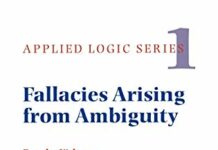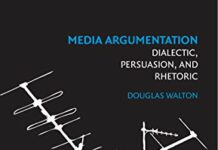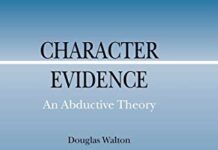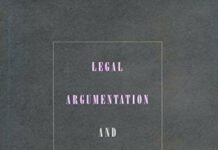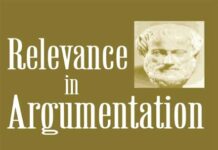
Ebook Info
- Published: 2005
- Number of pages: 360 pages
- Format: PDF
- File Size: 1.80 MB
- Authors: Douglas Walton
Description
Fundamentals of Critical Argumentation presents the basic tools for the identification, analysis, and evaluation of common arguments for beginners. The book teaches by using examples of arguments in dialogues, both in the text itself and in the exercises. Examples of controversial legal, political, and ethical arguments are analyzed. Illustrating the most common kinds of arguments, the book also explains how to evaluate each kind by critical questioning. Douglas Walton shows how arguments can be reasonable under the right dialogue conditions by using critical questions to evaluate them. The book teaches by example, both in the text itself and in exercises, but it is based on methods that have been developed through the author’s thirty years of research in argumentation studies.
User’s Reviews
Reviews from Amazon users which were colected at the time this book was published on the website:
⭐”Critical reasoning” and “argumentation” are two labels, which are now utilized in academia to generally refer to subject matter I originally studied as informal logic, particularly “informal” fallacies. “Critical thinking” is, to a large extent, a 21st Century modernization of Aristotelian logic.The eight chapters in the table of contents in Douglas Walton’s book provides an excellent formulation to address eight essential elements of critical reasoning in argumentation. Reviewing Douglas Walton’s table of contents provides an excellent outline and overview on which to orient one’s critical conceptualization of any particular issue – in this regard, Douglas Walton’s table of contents is much better analytical overview than provided by the table of contents of either of the two books noted below.AMAZON.com’s listing for Douglas Walton’s FUNDAMENTALS OF CRITICAL ARGUMENTATION has AMAZON’s “Look Inside” feature – so, prospective customer, take a “look inside” at the table of contents of this Douglas Walton book, which illustrates my contention about its value as an overview and useful analytical tool.There are two other books in the field of critical reasoning and argumentation which are comparable to Douglas Walton’s book, but which have their own individual strengths: a hardbound book titled CRITICAL THINKING: A CONCISE GUIDE, by Tracy Bowell and Gary Kemp; and a paperback book titled GOOD REASONS FOR BETTER ARGUMENTS: AN INTRODUCTION TO THE SKILLS AND VALUES OF CRITICAL THINKING, by Jerome E. Bickenbach and Jacqueline M. Davis. I have both of these books, as well as Douglas Walton’s book, and I consult them all, for the different perspectives they offer.The commonality of these three books is that critical reasoning always boils down to evaluating the reasoning involved in the context of any one particular individual argument – and in providing intellectual tools for “SPOTTING fallacies” in the reasoning of others, or in the reasoning of oneself.Of the three textbooks on the subject of “critical thinking/critical argumentation” of which I am aware, two (including this one) are authored by Canadian university professors, and one is authored by a Scottish and a New Zealand university professor. Has this subject caught on in the U.S.?The Birkenbach and Davis book, because it is a paperback, costs half the price of either of the two hardbound books. If you are a neophyte in the subject of “critical thinking,” this book is a good starting point for a quest into the “critical argumentation” field.As I learn, I am conscious of finding myself gravitating to an increasing overall preference for Douglas Walton’s FUNDAMENTALS OF CRITICAL ARGUMENTATION (2006), in contrast to the other two books noted above, which still remain good and valuable works.
⭐The reason I don’t give this book 5 stars is because it didn’t provided proposed solutions for the exercises at the end of every chapter.But apart from that, the book is excelent, it really fullfills it goals of teaching the fundamentals of critical argumentation using a lot examples easy to understand, and very well, Walton is really an expert in his field.I recomend it.
⭐It is easy to understand and has exercises that will help you apply the ideas. After reading this book you will start arguing with everyone; however, you will not fight with anyone ever again. That’s the difference. You will learn the critical skills that will catapult you far beyond your opponent’s next move.
⭐This book is really only useful for a very formal approach to argumentation. You will often re-read the same information as you go through the book as well. I would buy this used for as cheap as possible, not worth its full price.
⭐Written by Douglas Walton. ‘Nuff said.
⭐Great
⭐After reading a few books with argument or debate in the title, I finally found one that I really like. In fact I liked it so much that I am buying his other books about the subjects he covers in these chapters. He seems to take the state of the Art in informal Logic and argument studies and makes it easy to read for the lay person. In my opinion he does a better job of explaining the concepts that van Eemeren and Grootendorst write about than they do. If you are looking for a serious book about argument, and don’t want to wade through the details of competitive debate preparation or the seminar style ‘how to win an argument’ self-help books then look no further. Douglas Walton is involved in developing algorithms behind aspects of Artificial Intelligence and many of his books are listed in the bibliography on the nonsequitur(dot)com blog (a logical analysis of political media). Check out his downloadable articles on his website. You can find it through Google.
⭐As an interested layman, I wanted to get an introduction to the area of critical thinking / informal logic.After browsing through Amazon I decided to buy two books – this one by Walton and “Critical Thinking, Reading, and Writing: A Brief Guide to Argument” by Sylvan Barnet and Hugo Adam Bedau.Of the two books, I must say that I found the Barnet/Bedau book to be a much more pleasant and rewarding read. I would say that both books cover pretty much the same ground. But comparing Barnet/Bedau’s way of treating the subject with that of Walton’s, Walton’s writing stuck my as much less inspired, much more dry, and not engaging at all. It is seldom that I don’t finish a book that I buy, but that actually was the case here.True, Walton’s book can probably be said to represent a more formal treatment of the subject of critical thinking. However, personally, I felt I got the same information from the Barnet/Bedau book.So, my suggestion – if you’re interested in an overview/introduction to critical thinking: buy Barnet/Bedau’s book instead – that I found to truly be a pleasant read. Or, if not Beday, perhaps this one: “Critical Thinking: Tools for Taking Charge of Your Learning and Your Life” by Richard Paul. Although I haven’t read it yet, his youtube-clips lead me to believe that this book is probably preferable to Walton’s as well.
⭐good
⭐Excellent
Keywords
Free Download Fundamentals of Critical Argumentation (Critical Reasoning and Argumentation) in PDF format
Fundamentals of Critical Argumentation (Critical Reasoning and Argumentation) PDF Free Download
Download Fundamentals of Critical Argumentation (Critical Reasoning and Argumentation) 2005 PDF Free
Fundamentals of Critical Argumentation (Critical Reasoning and Argumentation) 2005 PDF Free Download
Download Fundamentals of Critical Argumentation (Critical Reasoning and Argumentation) PDF
Free Download Ebook Fundamentals of Critical Argumentation (Critical Reasoning and Argumentation)

